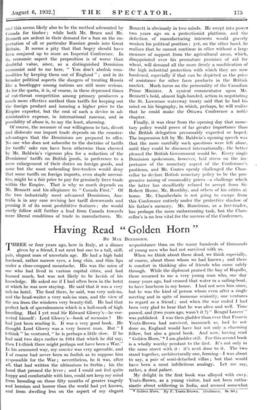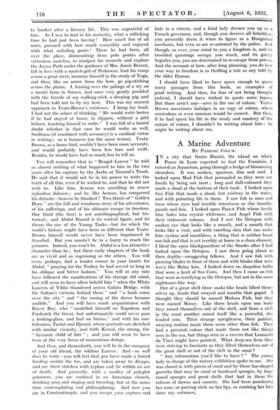Having Read "Golden Horn
BY MAX BEERBOHM.
THREE or four years ago, here in Italy, at a dinner given by a friend, I sat next but one to a tall, stiff, pale, elegant man of uncertain age. He had a high bald forehead, rather narrow eyes, a long chin, and thin lips under a close-cropped moustache. His was the mien of one who had lived in various capital cities, and had learned much, but was not likely to be lavish of his knowledge. He asked me if I had often been in the hotel at which he was now staying. He said that it was a very nah-iss hotel. The food there, he said, was very nah-iss, and the head-waiter a very nah-iss man, and the view of the sea from the windows very beauty-full. He had that perfect lack of querulousness which is a hall-mark of high breeding. Had I yet read Sir Edward Ghwey's—he cor- rected himself : Lord Ghwey's—book of memoirs ? He had just been reading it. It was a very good book. He thought Lord Ghwey was a very honest man. But "I t-think " he ventured, "he is perhaps a little slow. If he had said two days earlier in 1914 that which he did say, then I t-think there might perhaps not have been a War." In his armoured way, my convive was very agreeable, and I of course had never been so foolish as to suppose him responsible for the War ; nevertheless, he it was, after all, that had written the ultimatum to Serbia ; his the hand that pressed the lever ; and I could not feel quite happy and comfortable with him, could not keep my mind from brooding on those fifty months of greater tragedy and heroism and horror than the world had yet known, and from dwelling less on the aspect of my elegant acquaintance than on the many hundreds of thousands of young men who had not survived with us. When we think about these dead, we think especially, of course, about those whom we had known ; and there is comfort in thinking also of friends who came safely through. While the diplomat praised the bay of Rapallo, there recurred to me a very young man who, one day many years ago, had crossed that water in a sailing-boat, to have luncheon in-my house. I had not seen him since, but he was the kind of person whom even after a single meeting and in spite of immense seniority, one ventures to regard as a friend ; and when the war ended I had been very glad to hear that he was alive and well. Time passed, and (two years ago, wasn't it ?) " Bengal Lancer" was published. I was then gladder than ever that Francis Yeats-Brown had survived, inasmuch as, had he not done so, England would have lost not only a charming fellow, but also a grand book. And now, having read "Golden Horn,"* I am gladder still. For this second book is a wholly worthy pendant to the first. It's not only in the same street with it : it's next door to it. The two stand together, architecturally one, forming—I was about to say, a pair of semi-detached villas ; but that would have been a most infelicitous analogy. Let me say, rather, a dual palace.
My delight in the first book was alloyed with envy. Yeats-Brown, as a young visitor, had not been enthu- siastic about soldiering in India, and seemed somewhat * Golden Horn. By F. Yeats-Brown. (Gollenca. Se. 6c1.) to hanker after a literary life. This was ungrateful of him. As I was to find in his maturity, what a rollicking time he had just been having ! How much fun of all sorts, pursued with how much versatility and enjoyed with what unfailing gusto ! There he had been, all over the place, dismounting from polo ponies after victorious matches, to readjust his monocle and explore the Aryan Path under the guidance of Mrs. Annie Besant, fall in love with a nautch-girl of Peshawar, lead his troop across a great river, immerse himself in the study of Yoga, and then, like an arrow from the bow, go pig-sticking across the plains. I, leaning over the palings of a sty on a model farm in Sussex, had once very gently prodded with the ferrule of my walking-stick a sleeping pig, and had been told not to by my host. This was my nearest approach to Yeats-Brown's existence. I hung my head. I had not the solace of thinking, "He would write better if he had stayed at home, in slippers, without a pith helmet, teaching himself to write." I was full of a horrid doubt whether in that case he would write so well. Swiftness (if combined with accuracy) is a cardinal virtue in writing ; so is leanness (on the same terms). Yeats- Brown, as a home-bird, couldn't have been more accurate, and would probably have been less lean and swift. Besides, he would have had so much less to tell us.
You will remember that in "Bengal Lancer" he told us almost nothing of what happened to him in the two years after his capture by the Arabs at Nimrod's Tomb. He said that it would not be in his power to write the truth of all this, even if he wished to, and that he did not wish to. Like him, Aeneas was unwilling to renew infandunt dolorent ; and he, like Aeneas, has conquered his distaste—heaven be thanked ! Two thirds of" Golden Horn" are the full and wondrous story of his adventures, Of his sufferings, and of his ultimate escape to freedom. One third (the first) is not autobiographical, but his- torical; and Abdul Hamid is its central figure, and its theme the rise of the Young Turks—but for which the world's history might have been so different that Yeats- Brown himself would never have been imprisoned in Stambul. But you mustn't be in a hurry to reach the prisoner. Indeed, you won't be. Abdul is a less attractive character than he ; but these early chapters of the book are as vivid and as engrossing as the others. You will even, perhaps, find a tender corner in your hearts for Abdul, "praying for the Turkey he had served so long in his oblique and bitter fashion." You will at any rate have followed the ramifications of his strange old mind, and will seem to have often beheld him "when the White Lancers of Yildiz thundered across Galata Bridge, with the Sultan's victoria behind them" and "a hush come over the city" and "the cooing of the doves became audible." And you will have made acquaintance with Enver Bey, who "modelled himself on Napoleon and Frederick the Great, but unfortunately could never pass a looking-glass, and had no brains," and with his con- federates, Taalat and Djemal, whose portraits are sketched with similar vivacity, and with Kemal, the strong, the "dynamic child of fate " ; and you will seem to have been at the very focus of momentous doings.
And then, and thenceforth, you will be in the company of your old friend, the whilom Lancer. And—so well does he write—you will feel that you have made a forced landing amidst the foe, and are taken away to Aleppo, and are there stricken with typhus and lie within an ace of death. And presently, with a medley of polyglot prisoners, you are confined in an Armenian church, drinking araq and singing and brawling, but at the same time contemplating and philosophising. And now you are in Constantinople, and you escape your captors and hide in a cistern, and a kind lady dresses you up as a French governess, and, though you deceive all beholders, you presently deem it wiser to figure as a Hungarian mechanic, but even so are re-arrested by the police. And though, as ever, your mind to you a kingdom is, and its troubled questings occupy you much, and its gaiety beguiles you, you are determined to re-,escape from prison. And the account of how, after long planning, you do hew your way to freedom is as thrilling a tale as any told by the elder Dumas.
I should have liked to have space enough to quote many passages from this book, as examples of good writing. And then, for fear of not being thought judicial, I should have wished to quote some lapses. But there aren't any—save in the use of colons. Yeats. Brownsometimes indulges in an orgy of colons, where semicolons or even commas would be correct. But then, if he had spent his life in the study and mastery of the nature of colons, I shouldn't be writing about him : he might be writing about me.



























 Previous page
Previous page